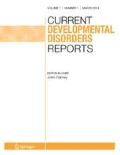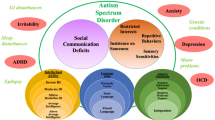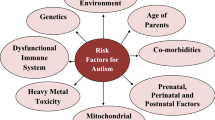Abstract
Purpose of Review
Autistic adults often experience unmet health-care needs. We conducted a review of the literature on the barriers and facilitators to health care for autistic adults without intellectual disability. We also describe examples of available health supports for this population.
Recent Findings
Barriers and facilitators to health care were grouped into three categories: (1) patient-level factors, (2) provider-level factors, and (3) system-level factors. Patient-level factors included communication issues, anxiety, sensory differences, socio-economic factors and previous experiences with health-care professionals. Provider-level factors included a lack of provider knowledge and training, and incorporating communication accommodations and supporters. System-level factors included accessibility of health-care facilities and limited referral pathways.
Summary
Autism training for health professionals with an emphasis on: managing communicative differences; changing practice environments to be more “autism friendly”; and approaching physical examinations in a mindful manner which respects sensory sensitivities, can help facilitate access to and engagement in health-care services for autistic adults. Few evidence based health supports for autistic adults exist, with greater research needed in this area.


Similar content being viewed by others
Notes
The official medical terminology is Autism Spectrum Disorder (ASD); however, we have decided to use Autism Spectrum Condition (ASC). The autistic co-author prefers this terminology as it communicates a neutral rather than negative and stigmatising perception associated with the term ‘disorder’.
This paper predominantly uses identity-first language (i.e., autistic adult) as preferred by many autistic adults and their allies.
References
Papers of particular interest, published recently, have been highlighted as: • Of importance •• Of major importance
American Psychiatric Association. Diagnostic and statistical manual of mental disorders: DSM-5. Fifth edition. ed. Arlington: American Psychiatric Publishing; 2013.
Brugha TS, Spiers N, Bankart J, Cooper S-A, McManus S, Scott FJ, et al. Epidemiology of autism in adults across age groups and ability levels. Br J Psychiatry J Ment Sci. 2016;209(6):498–503. https://doi.org/10.1192/bjp.bp.115.174649.
Roux AM, Shattuck PT, Rast JE, Anderson KA. National Autism Indicators Report: transition into young adulthood. Philidelphia: Life Course Outcomes Research Program, A.J. Drexel Autism Institute, Drexel University; 2015.
Hansen SN, Schendel DE, Parner ET. Explaining the increase in the prevalence of autism spectrum disorders: the proportion attributable to changes in reporting practices. Report. 2015;169(1):56–62. https://doi.org/10.1001/jamapediatrics.2014.1893.
Lai M-C, Baron-Cohen S. Identifying the lost generation of adults with autism spectrum conditions. Lancet Psychiatry. 2015;2(11):1013–27. https://doi.org/10.1016/S2215-0366(15)00277-1.
• Bargiela S, Steward R, Mandy W. The experiences of late-diagnosed women with autism spectrum conditions: an investigation of the female autism phenotype. J Autism Dev Disord. 2016;46(10):3281–94. https://doi.org/10.1007/s10803-016-2872-8This study provides valuable insight into how autistic females interact with health-care professionals and the importance of providing appropriate training to health-care professionals to ensure timely identification, diagnosis, mitigation of risk, and promoting the well-being of autistic females.
Baldwin S, Costley D, Warren A. Employment activities and experiences of adults with high-functioning autism and Asperger’s disorder. J Autism Dev Disord. 2014;44(10):2440–9. https://doi.org/10.1007/s10803-014-2112-z.
Frank F, Jablotschkin M, Arthen T, Riedel A, Fangmeier T, Hölzel LP, et al. Education and employment status of adults with autism spectrum disorders in Germany – a cross-sectional-survey. BMC Psychiatry. 2018;18(1):75. https://doi.org/10.1186/s12888-018-1645-7.
•• Warfield ME, Crossman MK, Delahaye J, Der Weerd E, Kuhlthau KA. Physician perspectives on providing primary medical care to adults with autism pectrum disorders (ASD). J Autism Dev Disord. 2015;45(7):2209–17. https://doi.org/10.1007/s10803-015-2386-9This article provides a good description of health-care professionals’ experiences in providing medical care to autistic adults, training received, training they lack, and suggestions for physicicans to providing this care.
Bilder D, Botts EL, Smith KR, Pimentel R, Farley M, Viskochil J, et al. Excess mortality and causes of death in autism spectrum disorders: a follow up of the 1980s Utah/UCLA autism epidemiologic study. J Autism Dev Disord. 2013;43(5):1196–204.
Rydzewska E, Hughes-Mccormack LA, Gillberg C, Henderson A, Macintyre C, Rintoul J, et al. Prevalence of long-term health conditions in adults with autism: observational study of a whole country population. BMJ. 2018;8(8):e023945. https://doi.org/10.1136/bmjopen-2018-023945.
• Foley K-R, Pollack AJ, Britt HC, Lennox NG, Trollor JN. General practice encounters for young patients with autism spectrum disorder in Australia. Autism. 2018;22(7):784–93. https://doi.org/10.1177/1362361317702560This paper compares the patient demographics and reasons for encounter in general practice for autistic patients in Australia.
Hall T, Kriz D, Duvall S, Nguyen-Driver M, Duffield T. Healthcare transition challenges faced by young adults with autism spectrum disorder. Clin Pharmacol Ther. 2015;98(6):573–5. https://doi.org/10.1002/cpt.254.
Murphy CM, Wilson CE, Robertson DM, Ecker C, Daly E, Hammond N, et al. Autism spectrum disorder in adults: diagnosis, management, and health services development. Neuropsychiatr Dis Treat. 2016;12:1669–86.
Lever A, Geurts H. Psychiatric co-occurring symptoms and disorders in young, middle-aged, and older adults with autism spectrum disorder. J Autism Dev Disord. 2016;46(6):1916–30. https://doi.org/10.1007/s10803-016-2722-8.
• Croen LA, Zerbo O, Qian Y, Massolo ML, Rich S, Sidney S, et al. The health status of adults on the autism spectrum. Autism. 2015;19(7):814–23. https://doi.org/10.1177/1362361315577517An in-depth description of the frequency of psychiatric and medical conditions of autistic adults in the United States.
Cashin A, Buckley T, Trollor JN, Lennox N. A scoping review of what is known of the physical health of adults with autism spectrum disorder. J Intellect Disabil. 2018;22(1):96–108. https://doi.org/10.1177/1744629516665242.
•• Hirvikoski T, Mittendorfer-Rutz E, Boman M, Larsson H, Lichtenstein P, Bolte S. Premature mortality in autism spectrum disorder. Br J Psychiatry. 2016;208(3):232–8. https://doi.org/10.1192/bjp.bp.114.160192This article examines the causes of mortality in ASC and investigates the impact of gender and intellectual disability.
•• Hwang YI, et al. Mortality and cause of death on Australians on the autism spectrum. Autism Res. 2019. This article reports the rates and risk factors for mortality and cause of death of autistic individuals in Australia.
Carbone MG, Miniati M, Simoncini M, Maglio A, Carmassi C, Dell’Osso L. Undetected autism subthreshold spectrum as risk factor for suicidal gestures in adulthood: a case report. J Psychopathol/G Psicopatol. 2018;24(1):37–40.
Mandell D. Dying before their time: addressing premature mortality among autistic people. Autism. 2018;22:234–5. https://doi.org/10.1177/1362361318764742.
Cassidy S, Bradley L, Shaw R, Baron-Cohen S. Risk markers for suicidality in autistic adults. Molecular Autism. 2018;9(1):42. https://doi.org/10.1186/s13229-018-0226-4.
Ousseny Z, Qian Y, Ray T, Sidney S, Rich S, Massolo M, et al. Healthcare service utilization and cost among adults with autism spectrum disorders in a U.S. integrated healthcare system. Autism Adulthood. 2018;1(1):10–36. https://doi.org/10.1089/aut.2018.0004.
Weiss JA, Isaacs B, Diepstra H, Wilton AS, Brown HK, McGarry C, et al. Health concerns and health service utilization in a population cohort of young adults with autism spectrum disorder. J Autism Dev Disord. 2018;48(1):36–44. https://doi.org/10.1007/s10803-017-3292-0.
•• Nicolaidis C, Raymaker D, McDonald K, Dern S, Boisclair CW, Ashkenazy E, et al. Comparison of healthcare experiences in autistic and non-autistic adults: a cross-sectional online survey facilitated by an academic-community partnership. Soc Gen Intern Med. 2012;28(6):761–9. https://doi.org/10.1007/s11606-012-2262-7An important study on the healthcare experiences and needs of autistic adults and the significant healthcare disparities they face.
Vohra R, Madhavan S, Sambamoorthi U. Emergency department use among adults with autism spectrum disorders (ASD). J Autism Dev Disord. 2016;46(4):1441–54. https://doi.org/10.1007/s10803-015-2692-2.
Wachob D, Pesci LJ. Brief report: knowledge and confidence of emergency medical service personnel involving treatment of an individual with autism spectrum disorder. J Autism Dev Disord. 2017;47(3):887–91. https://doi.org/10.1007/s10803-016-2957-4.
Lorenc T, Rodgers M, Marshall D, Melton H, Rees R, Wright K et al. Support for adults with autism spectrum disorder without intellectual impairment: systematic review. 2018. 22:654–668.
•• Raymaker DM, McDonald KE, Ashkenazy E, Gerrity M, Baggs AM, Kripke C, et al. Barriers to healthcare: instrument development and comparison between autistic adults and adults with and without other disabilities. Autism. 2017;21(8):972–84. https://doi.org/10.1177/1362361316661261An important study that identifies and compares barriers to healthcare experienced by autistic adults.
•• Zerbo O, Massolo ML, Qian Y, Croen LA. A study of physician knowledge and experience with autism in adults in a large integrated healthcare system. J Autism Dev Disord. 2015;45(12):4002–14. https://doi.org/10.1007/s10803-015-2579-2This article highlights healthcare providers’ lack of skills and tools to care for autistic adults and underscores the need to educate physicians caring for this population.
•• Bruder MB, Kerins G, Mazzarella C, Sims J, Stein N. Brief report: the medical care of adults with autism spectrum disorders-identifying the needs. J Autism Dev Disord. 2012;42(11):2498–504. https://doi.org/10.1007/s10803-012-1496-xThis study explores physician’s perspectives on providing care to autistic adults and reveals inadequate training in the care of this population and physicians interest in obtaining additional training.
•• Unigwe S, Buckley C, Crane L, Kenny L, Remington A, Pellicano E. GPS’ confidence in caring for their patients on the autism spectrum: an online self-report study. Br J Gen Pract. 2017;67(659):e445–e52. https://doi.org/10.3399/bjgp17X690449A study on understanding GPs’ perceived self-efficacy in identifying and managing their autistic patients and the urgent need to improve GPs’ confidence in caring for this population.
• Saqr Y, Braun E, Porter K, Barnette D, Hanks C. Addressing medical needs of adolescents and adults with autism spectrum disorders in a primary care setting. Autism. 2018;22(1):51–61. https://doi.org/10.1177/1362361317709970This study examines the medical comorbidities and medication use of autistic adults and explores barriers faced in providing medical care.
•• Dern S, Sappok T. Barriers to healthcare for people on the autism spectrum. Adv Autism. 2016;2(1):2–11. https://doi.org/10.1108/AIA-10-2015-0020This paper provides a comprehensive list of barriers to health for autistic adults and strategies to improve access to health care.
Vogan V, Lake JK, Tint A, Weiss JA, Lunsky Y. Tracking health care service use and the experiences of adults with autism spectrum disorder without intellectual disability: a longitudinal study of service rates, barriers and satisfaction. Disabil Health J. 2017;10(2):264–70. https://doi.org/10.1016/j.dhjo.2016.11.002.
• Tint A, Weiss JA. A qualitative study of the service experiences of women with autism spectrum disorder. Autism. 2018;22(8):928–37. https://doi.org/10.1177/1362361317702561This study discusses healthcare service use, unmet service needs, and barriers to care for autistic women.
•• Nicolaidis C, Raymaker DM, Ashkenazy E, McDonald KE, Dern S, Baggs AE, et al. “Respect the way I need to communicate with you”: healthcare experiences of adults on the autism spectrum. Autism. 2015;19(7):824–31. https://doi.org/10.1177/1362361315576221This article provides an in-depth understanding of autistic adults’ experiences with health care and their recommendations for improving care.
Lewis FL. Identifying autism spectrum disorder in undiagnosed adults. Nurse Pract. 2017;43(9):14–8. https://doi.org/10.1097/01.NPR.0000544285.02331.2c.
• Lum M, Garnett M, O’connor E. Health communication: a pilot study comparing perceptions of women with and without high functioning autism spectrum disorder. Res Autism Spectr Disord. 2014;8(12):1713–21. https://doi.org/10.1016/j.rasd.2014.09.009This study offers detailed insight into the healthcare communication and disparities of autistic women.
• Hillier A, Galizzi M, Ferrante K. Healthcare experiences of young adults with autism spectrum disorder. Adv Autism. 2017;3(4):206–19. https://doi.org/10.1108/AIA-06-2017-0014This study furthers the understanding of the healthcare experiences of young autistic adults in the United States.
Venkat A, Jauch E, Russell WS, Crist CR, Farell R. Care of the patient with an autism spectrum disorder by the general physician. Postgrad Med J. 2012;88(1042):472–81. https://doi.org/10.1136/postgradmedj-2011-130727.
Rynkiewicz A, Schuller B, Marchi E, Piana S, Camurri A, Lassalle A, et al. An investigation of the ‘female camouflage effect’ in autism using a computerized ADOS-2 and a test of sex/gender differences. Mol Autism. 2016;7(10):10. https://doi.org/10.1186/s13229-016-0073-0.
Au-Yeung SK, Bradley L, Robertson AE, Shaw R, Baron-Cohen S, Cassidy S. Experience of mental health diagnosis and perceived misdiagnosis in autistic, possibly autistic and non-autistic adults. Autism. 2018. https://doi.org/10.1177/1362361318818167.
• Barber C. Meeting the healthcare needs of adults on the autism spectrum. Br J Nurs. 2017;26(7):420–5. https://doi.org/10.12968/bjon.2017.26.7.420. This paper provides valuable insight into autistic adults’ attitudes towards receiving appropriate health care and support services.
•• Nicolaidis C, Kripke CC, Raymaker D. Primary care for adults on the autism spectrum. Med Clin N Am. 2014;98(5):1169–91. https://doi.org/10.1016/j.mcna.2014.06.011This article focuses on the identification of ASD in adults, referrals for services, the recognition of associated conditions, strategies and accommodations to facilitate effective primary care services, and ethical issues related to caring for autistic adults.
Clark A, Browne S, Boardman L, Hewitt L, Light S. Implementing UK Autism Policy & National Institute for Health and Care Excellence Guidance-assessing the impact of autism training for frontline staff in community learning disabilities teams. Br J Learn Disabil. 2016;44(2):103–10. https://doi.org/10.1111/bld.12116.
•• Nicolaidis C, Raymaker D, McDonald K, Kapp S, Weiner M, Ashkenazy E, et al. The development and evaluation of an online healthcare toolkit for autistic adults and their primary care providers. Society of General Internal Medicine. 2016;31(10):1180–9. https://doi.org/10.1007/s11606-016-3763-6This article examines and evaluates the development of AASPIRE’s health-care toolkit for autistic adults.
Academic Autism Spectrum Partnership in Research and Education (AASPIRE). Healthcare toolkit integration. USA. https://aaspire.org/projects/healthcare/healthcare-toolkit-integration/. Accessed 11 Nov 2018.
Ellie Wilson C, Roberts G, Gillan N, Ohlsen C, Robertson D, Zinkstok J. The NICE guideline on recognition, referral, diagnosis and management of adults on the autism spectrum. Adv Ment Health Intellect Disabil. 2013;8(1):3–14. https://doi.org/10.1108/AMHID-05-2013-0035.
National Collaborating Centre for Mental Health (UK). Autism: recognition, referral, diagnosis and management of adults on the autism spectrum, vol. 142. Leicester: British Psychological Society; 2012.
The National Autistic Society. Autism strategy guides - training. UK. https://www.google.com/url?sa=t&rct=j&q=&esrc=s&source=web&cd=1&ved=2ahUKEwjmsoyn7NXdAhWXw4MKHVDBDGYQFjAAegQIABAC&url=https%3A%2F%2Fwww.autism.org.uk%2F~%2Fmedia%2Fnas%2Fdocuments%2Fabout%2520autism%2Fadult-autism-strategy-2015%2Ftraining.ashx%3Fla%3Den-gb&usg=AOvVaw0DkuLQQPj-H0NUJi2efcwB. Accessed 25 Sept 2018.
Aylott J. The autism act 2009: developing specialist skills in autism practice. UK: Centre for Professional and Organisation Development, Sheffield Hallam University; 2011.
National Institute for Health and Care Excellence. Autism quality standard. England. 2014. https://www.nice.org.uk/guidance/qs51/resources/autism-pdf-2098722137029. Accessed 25 Sep 2018.
Royal College of General Practitioners. Resources to support GPs deliver care to autistic patients sent to every practice in England. England. 2016. http://www.rcgp.org.uk/about-us/news/2016/may/resources-to-support-gps-deliver-care-to-autistic-patients-to-be-sent-to-every-practice-in-england.aspx. Accessed 25 Sept 2018.
Royal College of General Practitioners. Autistic spectrum disorders toolkit. England. http://www.rcgp.org.uk/clinical-and-research/resources/toolkits/asd-toolkit.aspx. Accessed 25 Sept 2018.
Brodrick D, Lewis D, Worth A, Marland A. One-page patient passport for people with learning disabilities. Nurs Stand. 2011;25(47):35–40.
Bell R. Does he have sugar in his tea? Communication between people with learning disabilities, their carers and hospital staff. Tizard Learn Disabil Rev. 2012;17(2):57–63. https://doi.org/10.1108/13595471211218712.
Duffin C. Screening and passports can reduce health inequalities. Learn Disabil Pract. 2013;16(10):8–9. https://doi.org/10.7748/ldp2013.12.16.10.8.s9.
Lunsky Y. Hospital passports require standardisation to improve patient safety and person-centred care for those with intellectual disability. Evid Based Nurs. 2018;21(2):56. https://doi.org/10.1136/eb-2018-102869.
The National Autistic Society. My hosptial passport. UK. https://www.autism.org.uk/about/health/hospital-passport.aspx. Accessed 26 Sept 2018.
Ambitious about Autism. Our Toolkit. Not specified. https://www.ambitiousaboutautism.org.uk/our-toolkit. Accessed 20 Nov 2018.
Access Health Autism. Medical Appointment Form. 2018. http://accesshealthautism.com.au/wp-content/uploads/2018/08/Medical-appointment-form.pdf. Accessed 20 Nov 2018.
Funding
The authors acknowledge the financial support of the Cooperative Research Centre for Living with Autism (Autism CRC), established and supported under the Australian Government’s Cooperative Research Centres Program.
The PhD candidate (Pia Bradshaw) acknowledges the financial support of the Cooperative Research Centre for Living with Autism (Autism CRC), established and supported under the Australian Government’s Cooperative Research Centres Program.
Author information
Authors and Affiliations
Corresponding author
Ethics declarations
Conflict of Interest
Pia Bradshaw acknowledges the financial support (PhD scholarship) of the Cooperative Research Centre for Living with Autism (Autism CRC), established and supported under the Australian Government’s Cooperative Research Centres Program. Pia Bradshaw also reports being an autistic adult and incorporating personal experiences as an autistic adult into the article under Fig. 1. Elizabeth Pellicano, Mieke van Driel, and Anna Urbanowicz declare no conflicts of interest relevant to this manuscript.
Human and Animal Rights and Informed Consent
This article does not contain any studies with human or animal subjects performed by any of the authors.
Additional information
Publisher’s Note
Springer Nature remains neutral with regard to jurisdictional claims in published maps and institutional affiliations.
This article is part of the Topical Collection on Autism Spectrum
Rights and permissions
About this article
Cite this article
Bradshaw, P., Pellicano, E., van Driel, M. et al. How Can We Support the Healthcare Needs of Autistic Adults Without Intellectual Disability?. Curr Dev Disord Rep 6, 45–56 (2019). https://doi.org/10.1007/s40474-019-00159-9
Published:
Issue Date:
DOI: https://doi.org/10.1007/s40474-019-00159-9




